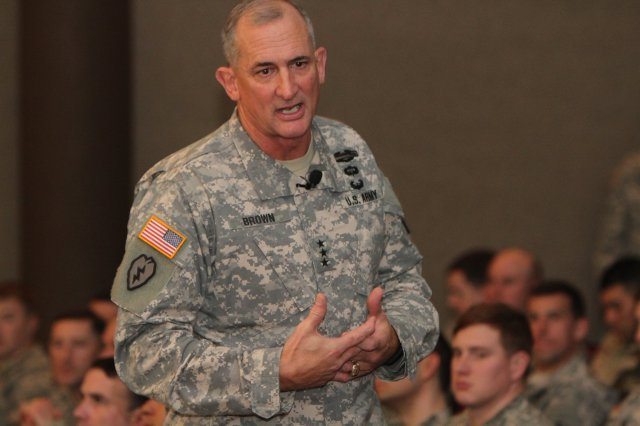Lt. Gen. Robert Brown, Army Combined Arms Center, or CAC, commanding general, visited Fort Sill, Jan. 20, to discuss the Army’s greatest asset — its Soldiers — and how the “human dimension” is vital to combating current and future conflicts.
“The key aspects of the human dimension are developing the right leaders for the future and the right Soldiers who can handle these complex problems,” Brown said.
With the new Training and Doctrine Command’s, or TRADOC, structure, Brown provides oversight to the centers of excellence and is the rater for Maj. Gen. John Rossi of the Fires Center of Excellence, or FCoE, and Fort Sill’s commanding general.
“I don’t think anything is more complicated than artillery and air defense,” Brown said. “Those two branches do an amazing job of integrating joint fires complicated problems and simplifying them to help us win on the battlefield.”
This was Brown’s first visit to the FCoE as CAC commander.
He spoke with lieutenants, captains and warrant officers in Kerwin Auditorium about how the field artillery and air defense artillery weapon systems and technology will change, but Soldiers are what will carry the nation to victory.
They are the ones who have to make “split second decisions when lives are at stake,” he said. Because of this “we better have the best leaders we can,” Brown insisted.
He said the Army used a quantitative advantage in the 1940s to defeat Nazi Germany. Then in the 1970s, the United States trained to defeat the Soviets with a technological advantage.
Now the Army is focusing on developing Soldiers as its best defense.
“The right leaders can solve any problem,” Brown said. “But if we have leaders who can’t think through the problem, can’t thrive, we’re hurting.”
He told Soldiers the way to accomplish that level of readiness is for each individual to have a passion to study their profession.
“You have to be hungry about learning,” he said. “You can’t just sit back and say, ‘well go ahead come on feed me.’ It’s impossible to do too much leader development.”
He recognized the challenges Soldiers face in numerous daily tasks that keep them from accomplishing higher goals, but he said it needs to be a priority, especially when the Army is drawing down.
“We’re fortunate in many ways and we have a lot of advantages, but we can’t sit back and just say we’re going to remain the best in the world. Never before in history have those who would do us harm had the same tools we have,” Brown said.
“The Human Dimension White Paper” states: “While preserving a technological edge will remain important, developing better equipment without developing better people is an insufficient strategy to retain overmatch in the face of highly adaptive adversaries,” he said.
“How effective is a 155 Howitzer against a cyber threat?” he asked Soldiers. “You have backup systems of course … but how well do our materiel solutions work against a cyber threat? Bottom line is they don’t work too well.
“The human dimension has always been there and has always been important, but never more important than it is now because a few people can have a greater impact than ever before,” Brown said.











